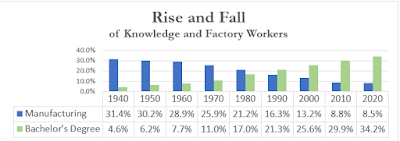I was chatting with mom after we'd been in to talk to him. I could not figure out what was going on. Finally, mom said, "I think your dad might just be having a stress attack of some kind. He can't believe that we have a black, Muslim socialist in the White House." At that I said, "Oh." And promptly drove back home, leaving him to his self-induced drama.
Growing up, I don't remember hearing about politics much. My parents had a lot of drama in their life and politics wasn't part of it. I read a lot and, as I got older, wrote a lot. It turns out that the combination of reading and writing resulted in a set of ideas that are little connected to my parents'. My dad and I probably cancelled each other's votes 90% of the time.
And yet I have become like my father in how I think about politics. Sort of.
Dad worked for Caltrans in highway design. In his last 5 or 10 years, he worked in traffic safety. They would simply identify dangerous sections of roads and highways based on statistics. On one section of road, accidents are 2X more likely. In another, someone is 20% more likely to die. And so on. They would analyze the data and then the section and redesign it so that accidents, injury and fatalities were less likely.
Police would identify individuals more likely to get in an accident. Lawyers would determine blame. That was not dad's job. His job was to make a section of road safer for everyone.
In that way, my sensibilities are very similar. I have a lot of conservative friends and even recessions they are likely to blame on individuals. I remember one conversation with conservative friends at the height of the Great Recession when the unemployment rate was nearly triple what it is now and they were discussing how someone's brother-in-law had taken a week's vacation (from looking for work) with his family in the midst of his unemployment. As if an outbreak of laziness somehow explained this outbreak of unemployment. They were the cops and lawyers, trying to figure out who was to blame and who to arrest.
I know that individual differences do make a difference. I just don't think those differences are very interesting or relevant. People worked 60 hours a week in 1900 and made about 1/8th of what we do. You might get excited explaining why one guy made 30% more than another in 1900 but that is incidental compared to the difference between that guy and his grandson who makes 800% more. That's fascinating. And relevant. And something you can aspire to "design" with a set of policies and technological and social inventions.
The questions that intrigue me are not the questions of the police about why someone got in an accident. My question is how we design the economy to lower the incidence of those accidents while still letting people drive faster. It turns out that even while I felt such a huge wave of relief to have Obama and Biden in to replace Bush and Cheney and my father thought it was a sign of the apocalypse, our perspectives are similar. (Well, his perspective on highways and mine on economies anyway.)
This Sunday will be my sixth Father's Day without dad. It is a curious thing how every generation knows what they'll reject from the previous generation but takes longer to realize the ways in which they are just like them.



















